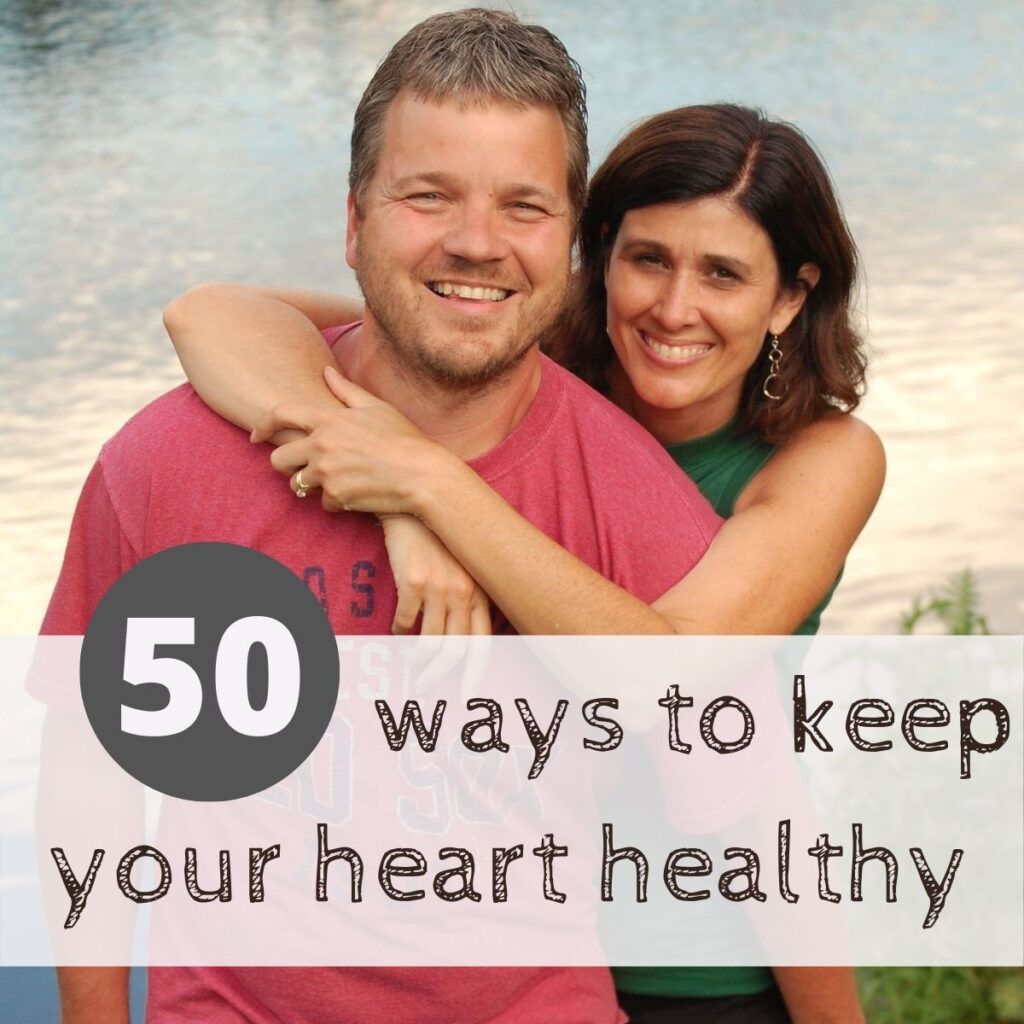
One person dies of cardiovascular disease every 36 seconds in the United States. That's about 665,000 people each year! Heart disease is the #1 killer of both men and women, and accounts for 1 in 3 deaths worldwide. Don't be a statistic.
Here are 50 Ways to Keep your Heart Healthy!
Eat a Heart Healthy Diet
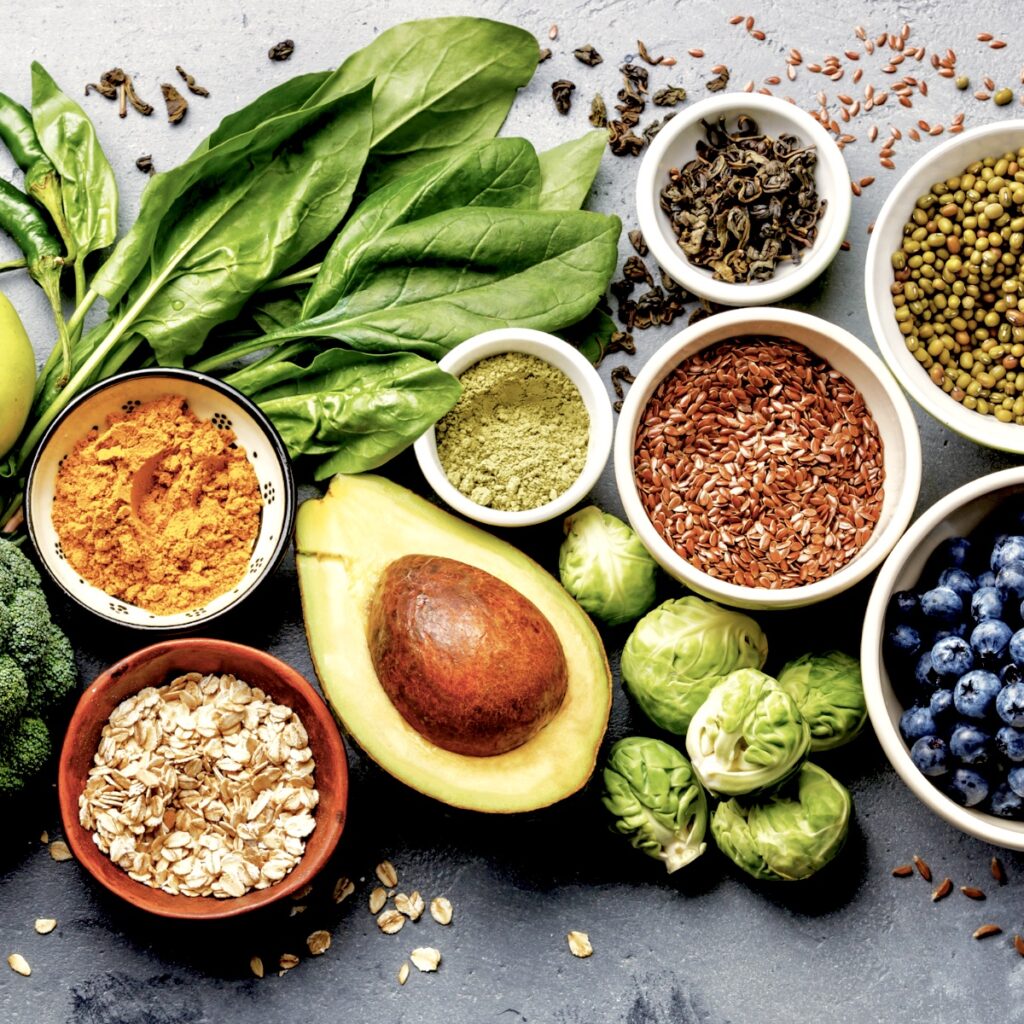
1. Start the day with a healthy smoothie - Smoothies are an excellent way to get in those extra servings of fruits and vegetables, which are packed full of heart healthy nutrients.
2. Add a tablespoon of chia seeds to cereal - Chia seeds are a great source of fiber, minerals, and omega-3 fatty acids, and may help to lower LDL (bad) cholesterol.
3. Stock up on oats - Oats are high in soluble fiber which helps bind cholesterol and remove it from your system. Get creative and add nut butters, fruit, cacao powder, nuts and/or seeds to your oatmeal for a nutrient packed meal. Oats are fantastic on fruit crisps too, such as my Healthy Peach Crisp with Oat Topping and Pecans!
4. Limit saturated fats - Foods such as fatty meats, cheese, butter, coconut oil, and cream contain saturated fats which raise LDL cholesterol in your blood, therefore increasing your risk of heart disease.
5. Sprinkle a handful of berries on top of a salad - Berries are super nutritious and delicious! They are low in calories and high in antioxidants which protect our bodies from cellular damage, thus lowering our risk of heart disease. Give some blueberries a try on my Superfood Kale Salad!
6. Consume fatty fish twice weekly - Salmon, trout, mackerel, sardines, and herring are great sources of omega-3 fatty acids that can help to lower both blood pressure and triglycerides, increase your HDL (good) cholesterol levels, and decrease the risk of cardiac arrest.
7. Indulge with a small serving of dark chocolate which is loaded with minerals and antioxidants that may help to lower both blood pressure and cholesterol levels.
8. Relax with a cup of green tea which just may be the healthiest beverage on the planet! It is loaded with antioxidants called catechins that may help to lower blood pressure and improve cholesterol levels.
9. Add avocados to your diet - Avocados are packed full of monounsaturated fat, potassium, and fiber. Studies have shown that they can lower LDL cholesterol and triglycerides, while raising HDL cholesterol. Snack on avocado toast, guacamole, or serve my Avocado Flower at the dinner table!
10. Add hemp hearts to baked goods such as muffins and pizza crust. Hemp hearts are the soft, inner part of hemp seeds and are a great source of arginine which dilates and relaxes the blood vessels. This may help decrease blood pressure and risk of heart disease.
11. Avoid the salt shaker - Sodium can increase your blood pressure and risk of heart attack and heart failure. The Daily Guidelines for Americans recommends limiting sodium intake to 2,300 mg/day, which is the amount found in just one teaspoon of salt. Sodium is found naturally in many foods, so it may be wise to skip the shaker.
12. Spice things up - Spices don’t just flavor our food, they are also full of phytochemicals that have many health benefits. Be sure to stock your pantry with these heart healthy spices: garlic powder, onion powder, cayenne, cilantro, turmeric, cardamom, ginger, and cinnamon.
13. Read food labels - Be sure to check food labels for calories, saturated fat, and sodium. Shoot for less than 15 grams of saturated fat and less than 2,300 mg of sodium per day. Don't forget to check the portion size too!
14. Have a glass of red wine - Some research has found that drinking red wine in moderation may help protect the lining on the blood vessels in the heart, lower cholesterol, and prevent blood clots. Not a wine drinker? Reap the same benefit from a handful of red grapes, which also contain the polyphenol, resveratrol, which supports heart health.
15. Eat more vegetables - Veggies are low in calories and full of nutrition, and most Americans are not eating as many as they should! Snack on raw vegetables, add them to soups, fill half your plate with them at meals. Eat a rainbow of colors for optimal health!
16. Discover ancient grains - Both quinoa pronounced <keen-wah>, and farro have gained popularity and are quite versatile. High in protein, fiber, and healthy fats, they can easily be added to soups and are delicious in my Vegetarian Stuffed Peppers!
17. Drink more water - A study in the American Journal of Medical Epidemiology found that participants who drank five or more glasses of water per day had a lower risk of dying from heart disease than those who drank less than two glasses per day. Drinking a glass of water before bed may help improve circulation during the hours you’re at greatest risk for having a heart attack.
18. Incorporate beans into your diet - Possibly the world’s healthiest food, beans are loaded with protein, fiber, vitamins, and minerals! They are also rich in polyphenols, antioxidants that may help to decrease inflammation, and soluble fiber which can help decrease LDL cholesterol. Add a handful to your next soup or stew!
19. Add a tablespoon of flaxseed to yogurt - Flax seeds are a great source fiber and omega-3 fatty acids, and may help to lower inflammation and risk of having a heart attack
20. Go nuts - Snack on a small handful of almonds or walnuts which are packed full of vitamin E, magnesium, and healthy fats. People who eat nuts regularly are less likely to have heart attacks or die from heart disease than those who rarely eat them.
21. Don't forget the EVOO - Extra virgin olive oil is an essential part of the Mediterranean diet (voted best diet) and for good reason. It may help to fight inflammation, lower blood pressure and improve cholesterol levels. It's super good on my Mediterranean Chicken Salad!
Be Active
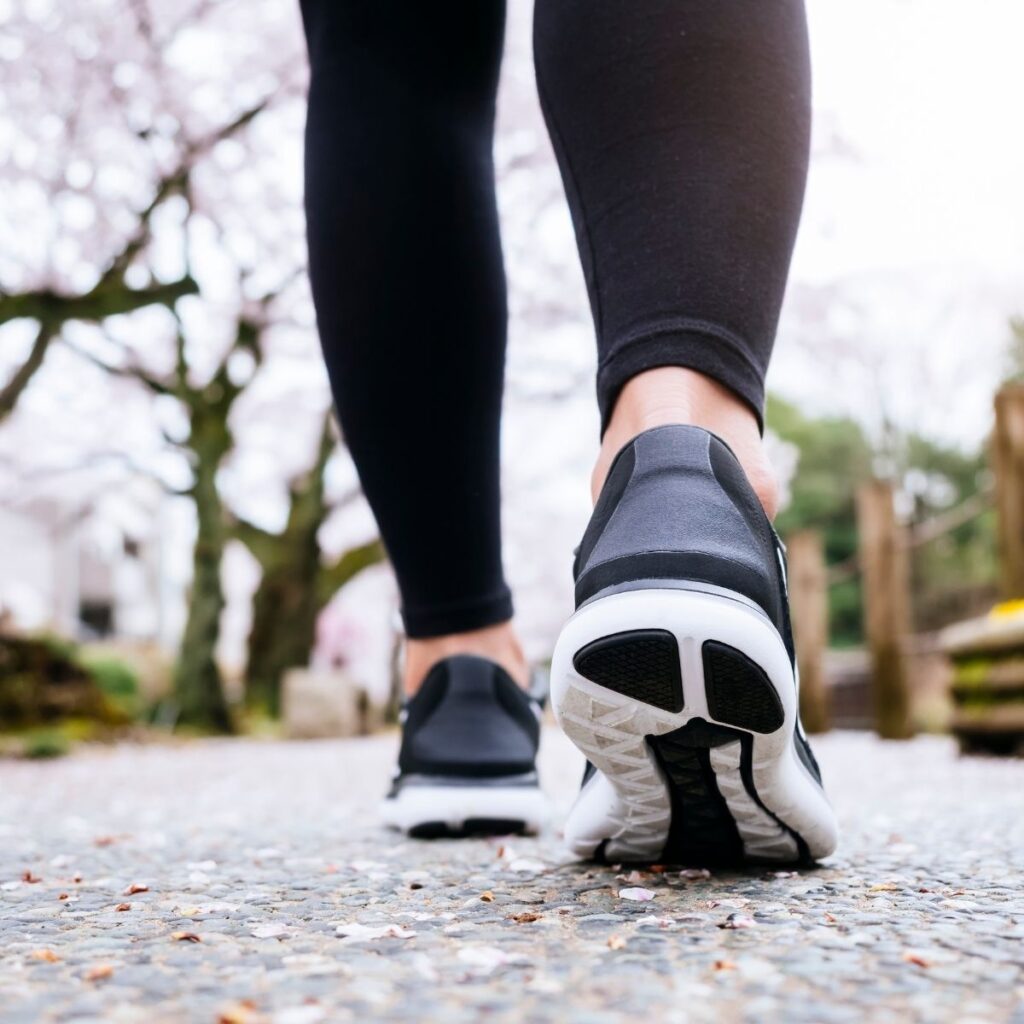
22. Take a walk on your lunch break - Walking can be a great form of cardio exercise if you go at a brisk pace of at least 3 miles per hour. Get that blood flowing and your heart beating faster. This will help strengthen your heart and blood vessels.
23. Park further away at the grocery store - Take advantage of every opportunity you have to get more exercise!
24. Take the stairs, not the elevator - Climbing stairs not only gets your heart pumping, but can also strengthen your muscles. Take them every chance you have!
25. Go dancing - Dancing is a great form of aerobic exercise that burns just as many calories as jogging. Not to mention it is super fun and good for your mental health too.
26. Clean the house - Yes! Cleaning counts as exercise as long as you do it at a fast pace to increase your heart rate. Turn on some of your favorite music and have a fun workout.
27. Go for a bike ride - Cycling is a great form of exercise and is easy on the joints. It can help promote weight loss, improved muscle strength, and mental well-being.
28. Hike a mountain - If you're looking for a more intense workout, consider going for a hike. Not only is it healthy for the heart, but soothing to the soul.
29. Lift weights - Research suggests that weight training can be just as effective as cardio exercise for protecting against heart attacks. And the good news is that you can benefit from just an hour of weight lifting per week.
30. Invest in a fitness tracker - What a great way to hold yourself accountable. A fitness tracker will monitor your both your heart rate and steps that you have taken throughout the day.
Manage Stress

31. Aromatherapy - Aromatic essential oils can enhance both your physical and emotional health. Jasmine, lavender, bergamot, chamomile, and frankincense are just a few that may help relieve stress, anxiety, and depression.
32. Treat yourself to a massage - Not only is a massage extremely relaxing, but it can also help improve circulation and decrease heart rate and blood pressure.
33. Knit a scarf - Knitting is a therapeutic activity that can relieve stress and anxiety, while boosting motivation, self-esteem, and mood. Jigsaw puzzles and adult coloring books are also fun activities that can keep your mind busy.
34. Meditate - Meditating just 5-10 minutes each day will leave you feeling calm and may help relieve anxiety, depression, and pain. It may even help you fall asleep!
35. Laugh more - There is some truth to the saying, "laughter is the best medicine". A good laugh will decrease stress hormones, increase blood flow, lower blood pressure, and reduce artery inflammation. The effects can last for up to 45 minutes!
36. Take a yoga class - Yoga can strengthen the mind, body, and spirit. Practicing yoga regularly may help to lower blood pressure, heart rate, and cholesterol levels.
37. Spend the afternoon gardening - A 2019 study published in the British Journal of Sports Medicine found that participants who engaged in leisure-time physical activity, such as gardening for an hour each week, had a 12% lower risk of death from cardiovascular disease, including a heart attack.
38. Listen to music - Studies have shown that listening to music for just 20-30 minutes each day helps to lower blood pressure, decrease heart rate, and relieve stress and anxiety.
39. Take a pilates class - Pilates is a form of low-impact exercise that can help you to lose fat, build muscle, strengthen the mind-body connection, and relieve stress.
40. Practice mindfulness - Mindfulness is the simple act of paying attention to how you're feeling in the current moment. Research shows that we spend almost half our time thinking about something other than what we are doing in that moment. This can lead to unnecessary stress and anxiety. I highly recommend the book Wherever You Go, You are There, by Jon Kabat-Zinn to learn more.
41. Find your happy place - Scientific evidence reveals that being happy can have many health benefits. A positive attitude can help combat stress, boost your immune system, protect your heart, reduce pain, and may even lengthen your lifespan. Do things that bring you joy! Read a book, go to the beach, visit with a loved one, or volunteer at a soup kitchen. The possibilities are endless.
Other Ways to Keep Your Heart Healthy

42. Know your numbers - BMI (body mass index), blood pressure, cholesterol, triglycerides and blood sugars. These numbers are very helpful in determining your risk for developing cardiovascular disease.
43. Shed excess weight - Being overweight, especially around your middle, increases your risk of heart disease. Waist circumference is a useful tool that can help measure how much abdominal fat you have. The risk of heart disease is higher if your waist circumferences is greater than 40 inches for men and 35 inches for women.
44. Quit smoking or do not start - No ifs, ands, or butts! Smoking tops the list as a primary risk factor for heart disease. In the United States, smoking has accounted for 33 percent of all deaths from cardiovascular disease according to the CDC.
45. Avoid secondhand smoke - Nonsmokers who are exposed to secondhand smoke increase their risk of developing heart disease by 25-30%. Secondhand smoke causes nearly 34,000 premature deaths from heart disease each year in the U.S.
46. Limit alcohol consumption - Heavy drinking can increase triglyceride levels and lead to high blood pressure, cardiomyopathy, cardiac arrhythmias, and heart failure. Limit alcohol consumption to one drink per day for women and no more than two for men.
47. Engage in sexual activity- Sex is a form of exercise that may help strengthen your heart, lower your blood pressure, reduce stress, and improve sleep.
48. Sleep at least 7-8 hours per night - Did you know that a good night’s sleep not only leaves you feeling energized and well rested, but also decreases your risk of heart disease and high blood pressure? Need help falling asleep? Be sure to read my blog post, How to Fall Asleep Naturally!
49. Rescue a dog - Rescuing a dog can have a positive impact on your health. Just petting a dog may help lower your blood pressure and relieve stress. Having a dog around may also decrease anxiety and depression. And walking your dog will keep you both active and healthy!
50. Brush your teeth twice daily and floss daily - Gum disease is associated with an increased risk of developing heart disease. Poor oral hygiene can lead to bacteria entering the blood stream, which may in turn affect the heart valves.
*Please consult with your health care practitioner regarding alcohol consumption and physical activity if you have have any pre-existing health conditions. Need additional help? Consult with a dietitian for customized nutrition therapy, or speak with your healthcare practitioner about the need for medication.
Did you find this article helpful? Leave me a comment below!

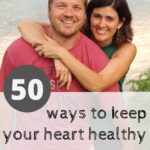
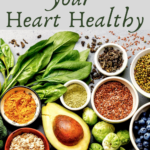
Great article and great tips.Advances in technology now offers the medical practice the alternative of hiring virtual medical assistants, freeing you from much of the expense that comes with on boarding new employees.